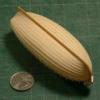-
Posts
13,368 -
Joined
-
Last visited
Content Type
Profiles
Forums
Gallery
Events
Everything posted by druxey
-
CipperFan: get better first, and hopefully with an uneventful recovery. That is more important. I'm sure Rob can wait!
- 3,560 replies
-
- clipper
- hull model
-
(and 2 more)
Tagged with:
-
Well done indeed, Steven. It has been interesting to follow your journey into uncharted territory and ending up with a plausible result. I've enjoyed the presentation of what evidence you had in order to arrive at an outstanding conclusion. And thank you for putting up with my admittedly terrible puns.
-
Looks as if Gregory's captive audience looks none too happy. "I have to row and listen to him?" The Madrid image has the steersman using a double-handed grip, I note.
-

Swan-Class Sloop by Stuglo - FINISHED - 1:48
druxey replied to stuglo's topic in - Build logs for subjects built 1751 - 1800
Sure gives you an appreciation for the shipwrights of old and why apprenticeships were seven years long. You worte: "Marvellous how alcohol helps a problem." One way or another!- 475 replies
-

Swan-Class Sloop by Stuglo - FINISHED - 1:48
druxey replied to stuglo's topic in - Build logs for subjects built 1751 - 1800
Without seeing the actual model, I really wouldn't want to advise you of the best course to take. Perhaps more photos might make the situation clearer to see.- 475 replies
-

Swan-Class Sloop by Stuglo - FINISHED - 1:48
druxey replied to stuglo's topic in - Build logs for subjects built 1751 - 1800
At each step, be as accurate as you possibly can be. Cumulative error adds up very quickly. Errors never seem to cancel each other out! For cant frames and hawse pieces, check all these factors: 1) Angle of foot 2) Height of step 3) Height from the board to the toptimber line 4) Verticality 5) For hawse timbers, the accumulated width across them as you add each one 6) For cant frames, making sure that the sided dimension (thickness ) at the foot is correct and does not push the next cant off its step 7) Width must equal that of the maximum breadth on the baseboard- 475 replies
-
When starting out using silver solder, there will be more failures than successes. However, after a while, success will become routine stuff. Occasionally, though, there will be a day where nothing goes right. I had one of those last week. Either the wind was in the wrong direction, the milk had gone sour or I'd stepped on the cat, but when one experiences failure after failure, walk away. The next day I nailed it first time. There's alchemy in there somewhere....
-
The other possibility is to reduce the gas flow on the torch (if you can) so that the flame does not blow away the silver solder paillon.
-
I guess that the windlass won't wind, alas! It's interesting the things one discovers on the journey of a build. Either "They can't possibly have done that like that," or "Aha! So that what that's for!".
About us
Modelshipworld - Advancing Ship Modeling through Research
SSL Secured
Your security is important for us so this Website is SSL-Secured
NRG Mailing Address
Nautical Research Guild
237 South Lincoln Street
Westmont IL, 60559-1917
Model Ship World ® and the MSW logo are Registered Trademarks, and belong to the Nautical Research Guild (United States Patent and Trademark Office: No. 6,929,264 & No. 6,929,274, registered Dec. 20, 2022)
Helpful Links
About the NRG
If you enjoy building ship models that are historically accurate as well as beautiful, then The Nautical Research Guild (NRG) is just right for you.
The Guild is a non-profit educational organization whose mission is to “Advance Ship Modeling Through Research”. We provide support to our members in their efforts to raise the quality of their model ships.
The Nautical Research Guild has published our world-renowned quarterly magazine, The Nautical Research Journal, since 1955. The pages of the Journal are full of articles by accomplished ship modelers who show you how they create those exquisite details on their models, and by maritime historians who show you the correct details to build. The Journal is available in both print and digital editions. Go to the NRG web site (www.thenrg.org) to download a complimentary digital copy of the Journal. The NRG also publishes plan sets, books and compilations of back issues of the Journal and the former Ships in Scale and Model Ship Builder magazines.


